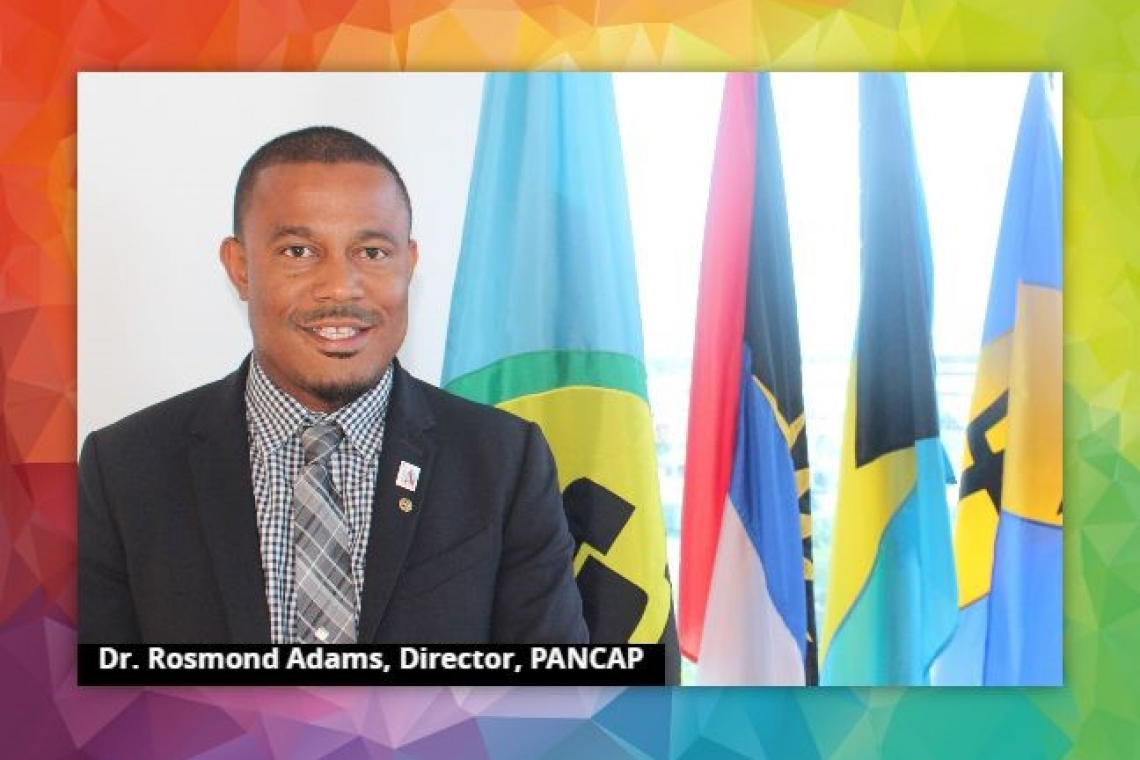PANCAP Director Dr. Rosmond Adams.
GEORGETOWN, Guyana--The Pan-Caribbean Partnership against HIV and AIDS PANCAP, the mechanism that provides a structured and unified approach to the Caribbean’s response to the HIV epidemic, will convene a virtual three-day meeting of national AIDS programme (NAP) managers, civil society organisations (CSOs) and key partners, June 2-4, to discuss the impact of the COVID-19 pandemic on national and regional HIV programmes. The meeting will also discuss how countries are coping and adjusting programme delivery during COVID-19 to ensure sustainability.
Stakeholders will also decide how the partnership and key partners can support countries in ensuring programme continuity despite disruptions.
The meeting is occurring several weeks after the Joint United Nations Programme on HIV/AIDS UNAIDS launch of the Global AIDS Strategy 2021-2026, End Inequalities, End AIDS. The strategy focuses on inequalities and closing the gaps hindering progress to end AIDS. It sets out new targets and policies to be reached by 2025.
PANCAP Director Dr. Rosmond Adams stated that the meeting is critical to the new trajectory of the region’s HIV response as countries continue to be challenged by COVID-19.
“A survey conducted by PANCAP and Pan American Health Organization (PAHO) last year showed that during 2020, facility- and community-based HIV testing services reduced by two-thirds (69 per cent) in countries due to COVID-19,” stated Dr. Adams. “The meeting will facilitate essential discussions on how national programmes and civil society organisations can collaborate to ensure continuity of access to HIV prevention, care and treatment for the most vulnerable populations.”
The PANCAP director also expressed concern about protecting the gains made in the HIV response even as the region is experiencing another wave of COVID-19 infections. “COVID-19 has strained health systems and exposed gaps in public health,” stated the PANCAP director. “From the highest levels of national leadership to community-based health facilities, human, financial and research resources were diverted from HIV efforts.”
He indicated that it is critical for stakeholders at the upcoming meeting to reach a consensus on advocating and encouraging governments and policymakers to increase, maintain and guard domestic resources allocated for HIV.
The forum is also occurring as the world marks 40 years since the first cases of AIDS were reported and prior to the upcoming United Nations General Assembly High-Level Meeting on HIV and AIDS 2021. The outcome of the meeting will determine the continued success of the HIV response in the face of strained public health systems and what the response will look like in the post-COVID Caribbean.
The Global AIDS Strategy 2021-2026 targets and commitments are as follows:
* The number of people who newly acquire HIV will decrease from 1.7 million in 2019 to less than 370,000 by 2025.
* The number of people dying from AIDS-related illnesses will decrease from 690,000 in 2019 to less than 250,000 in 2025.
* The goal of eliminating new HIV infections among children will see the number of new HIV infections drop from 150,000 in 2019 to less than 22,000 in 2025.
Gains in the region’s HIV response
Through collaborative efforts of the Caribbean Community CARICOM-PANCAP and Member States, the Caribbean had seen significant achievements at the end of 2019, including a decline in overall regional prevalence from 2.2 per cent to less than 1.1 per cent in 2019; a decrease in new HIV infections by 29 per cent in the region since 2010, a reduction in AIDS-related deaths by 37 per cent since 2010 and total antiretroviral treatment coverage for the region was 63 per cent – 71 per cent for women and 56 per cent for men (compared to five per cent in 2001).
In 2019, 77 per cent of people living with HIV in the Caribbean knew their status; 81 per cent of those diagnosed were on treatment, and 80 per cent of those on antiretroviral therapy were virally suppressed.
The region achieved tremendous progress with the elimination of mother-to-child transmission of HIV in seven countries, including Anguilla, Antigua and Barbuda, Bermuda, The Cayman Islands, Montserrat and St. Kitts and Nevis, in 2017. Cuba became the first country in the world to achieve elimination in 2015.







